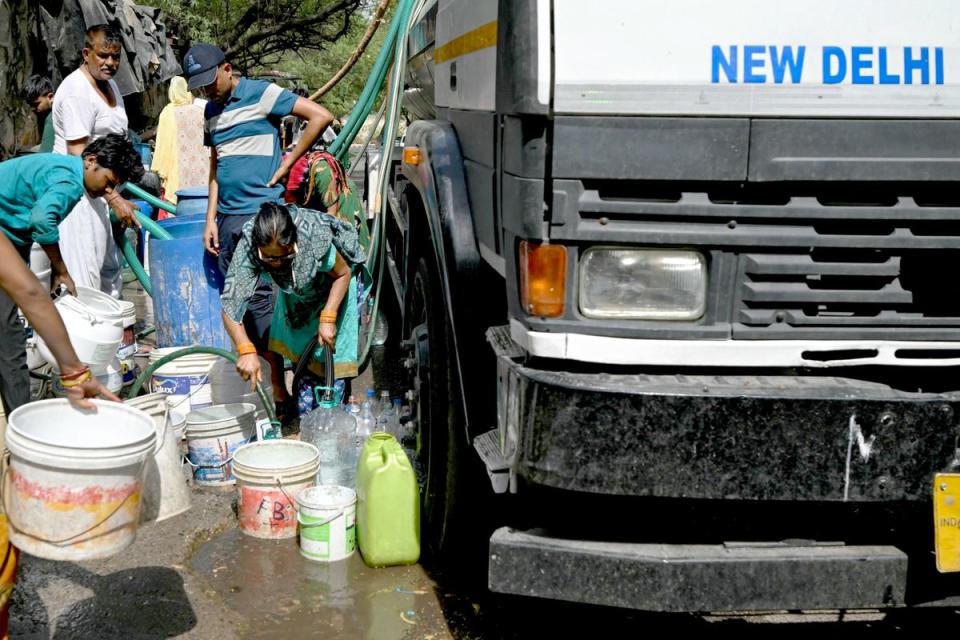India sees over hundred deaths and 40,000 cases of suspected heatstrokes
Over 40,000 cases of suspected heatstroke have been reported in India as gruelling temperatures continued to scorch the country this week in what is now confirmed to be its “longest heatwave ever”.
At least 52 bodies were brought to hospitals in the past two days, the Times of India reported, most of them poor, outdoor workers.
Government figures say 110 deaths have been recorded between 1 March and 18 June. However, activists and experts say the numbers could be much higher than that.
In the last 72 hours alone, five people have been killed due to heatstrokes in Delhi, TOI said. The temperatures in Delhi have been above 44C once again.
The city also experienced its hottest night ever on Wednesday with the minimum temperature scaling to 35.2C, eight degrees above normal, according to the weather department.
Night temperatures can be particularly dangerous for human health as it deprives the body from the required rest from heat stress.
Doctors at Safdarjung Hospital, where two of five deaths occurred, said at least 28 patients were diagnosed with heatstrokes in recent days, the newspaper reported.
Several surgeries were also postponed in the sports injury centre of the hospital due to water shortage, Hemant Rajoura, a Hindustan Times correspondent shared on X.
Breaking : Many surgeries got postponed in the Sports injury centre of Safdarjung hospital due to unavailability of water at time as the tanker could not reach the hospital. AC was not working for some time. #Heatwave #Watercrisis
— Hemant Rajaura (@hemantrajora_) June 19, 2024
The health ministry ordered federal and state institutions to ensure immediate attention to patients, while hospitals were directed to make more beds available.
Heat exhaustion, which can include dizziness, headaches, shaking and thirst, can affect anyone. However, it can be particularly dangerous for vulnerable groups, such as children, the elderly and the ill.
In more serious cases it can lead to a heatstroke, when the body’s core temperature goes above 40.6C (105F).
One of the patients who died in Delhi’s RML hospital on Tuesday had a body temperature of 110F (43C). Higher body temperature is a medical emergency and can lead to long-term organ damage and death. Symptoms include rapid breathing, confusion or seizures, and nausea.
Millions of people in Delhi have been living under extreme temperatures since April, with the country recording its longest heatwave ever this year.
The heatwave has exacerbated the water and electricity crisis. People have been queueing up in front of tankers as regular supply faces interruption. Fines have been imposed on people for wasting water.

Delhi’s water minister, Atishi, has threatened to go on an indefinite strike in a letter to prime minister Narendra Modi. She has blamed neighbouring Haryana state for not releasing excess water for Delhi.
Meanwhile, power cuts have increased and engineers have warned of excess strain on grids due to record power consumption as more appliances run to beat the heat.
Heatwaves are also stressing animals. Several bats dropped dead from trees on Tuesday in Uttar Pradesh’s Kanpur due to extreme heat. The carcasses were found in the city’s Nanarao Park, where hundreds of bats live.
Earlier, dozens of monkeys were found drowned in a well in Jharkhand as they were searching for water amid drying lakes.
Billions of people in the northern hemisphere have been under record temperatures this summer, including countries in southeast Asia, middle east, as well as United States.
As the climate crisis continues to drive temperatures upward in coming years, the danger of humidity is also expected to rise. Warmer air can hold more moisture. And more moisture in the air makes it harder for people to sweat to cool down.
Many countries do not record heat as a specific cause of death but a 2021 study in The Lancet estimated that just under a half-million deaths can be attributed to excess heat every year - a conservative count that lacks data from many low-income countries.

 Yahoo News
Yahoo News 
